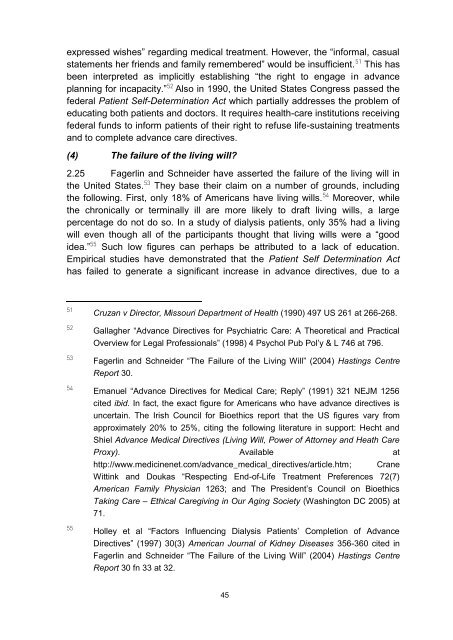Consultation Paper on Bioethics - Law Reform Commission
Consultation Paper on Bioethics - Law Reform Commission
Consultation Paper on Bioethics - Law Reform Commission
Create successful ePaper yourself
Turn your PDF publications into a flip-book with our unique Google optimized e-Paper software.
expressed wishes” regarding medical treatment. However, the “informal, casual<br />
statements her friends and family remembered” would be insufficient. 51 This has<br />
been interpreted as implicitly establishing “the right to engage in advance<br />
planning for incapacity.” 52 Also in 1990, the United States C<strong>on</strong>gress passed the<br />
federal Patient Self-Determinati<strong>on</strong> Act which partially addresses the problem of<br />
educating both patients and doctors. It requires health-care instituti<strong>on</strong>s receiving<br />
federal funds to inform patients of their right to refuse life-sustaining treatments<br />
and to complete advance care directives.<br />
(4) The failure of the living will?<br />
2.25 Fagerlin and Schneider have asserted the failure of the living will in<br />
the United States. 53 They base their claim <strong>on</strong> a number of grounds, including<br />
the following. First, <strong>on</strong>ly 18% of Americans have living wills. 54 Moreover, while<br />
the chr<strong>on</strong>ically or terminally ill are more likely to draft living wills, a large<br />
percentage do not do so. In a study of dialysis patients, <strong>on</strong>ly 35% had a living<br />
will even though all of the participants thought that living wills were a “good<br />
idea.” 55 Such low figures can perhaps be attributed to a lack of educati<strong>on</strong>.<br />
Empirical studies have dem<strong>on</strong>strated that the Patient Self Determinati<strong>on</strong> Act<br />
has failed to generate a significant increase in advance directives, due to a<br />
51 Cruzan v Director, Missouri Department of Health (1990) 497 US 261 at 266-268.<br />
52 Gallagher “Advance Directives for Psychiatric Care: A Theoretical and Practical<br />
Overview for Legal Professi<strong>on</strong>als” (1998) 4 Psychol Pub Pol‟y & L 746 at 796.<br />
53 Fagerlin and Schneider “The Failure of the Living Will” (2004) Hastings Centre<br />
Report 30.<br />
54 Emanuel “Advance Directives for Medical Care; Reply” (1991) 321 NEJM 1256<br />
cited ibid. In fact, the exact figure for Americans who have advance directives is<br />
uncertain. The Irish Council for <strong>Bioethics</strong> report that the US figures vary from<br />
approximately 20% to 25%, citing the following literature in support: Hecht and<br />
Shiel Advance Medical Directives (Living Will, Power of Attorney and Heath Care<br />
Proxy). Available at<br />
http://www.medicinenet.com/advance_medical_directives/article.htm; Crane<br />
Wittink and Doukas “Respecting End-of-Life Treatment Preferences 72(7)<br />
American Family Physician 1263; and The President‟s Council <strong>on</strong> <strong>Bioethics</strong><br />
Taking Care – Ethical Caregiving in Our Aging Society (Washingt<strong>on</strong> DC 2005) at<br />
71.<br />
55 Holley et al “Factors Influencing Dialysis Patients‟ Completi<strong>on</strong> of Advance<br />
Directives” (1997) 30(3) American Journal of Kidney Diseases 356-360 cited in<br />
Fagerlin and Schneider “The Failure of the Living Will” (2004) Hastings Centre<br />
Report 30 fn 33 at 32.<br />
45

















